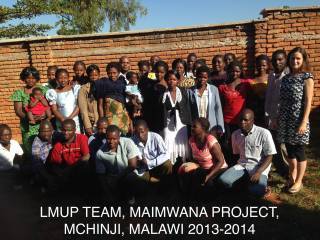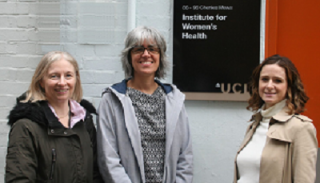The Sexual and Reproductive Health Research tem in the Institute of Women’s Health is an internationally renowned centre of expertise on the measurement of pregnancy planning. Dr Geraldine Barrett, Principal Research Associate, developed the London Measure of Unplanned Pregnancy (LMUP), a psychometrically validated measure of pregnancy intention now in use worldwide (see www.lmup.org.uk for more information). Dr Jennifer Hall (Principal Clinical Researcher) has extensive experience of validating, using and analysing the LMUP. Together, Dr Barrett and Dr Hall provide methodological advice and support to those wishing to evaluate and use the LMUP around the world, including Uganda, Botswana, Mexico, South Africa, Sri Lanka and Australia.
They regularly update the LMUP handbook/website and publish methodological research relating to the LMUP. Current projects include collaborations with colleagues in India, Nepal, and France.
Women’s equality and empowerment is one of the UN Sustainable Development Goals. Women and girls deserve access to equal rights and opportunity, and to live without violence or discrimination. Female genital mutilation is a violation of the basic rights of women and girls. In developing countries, it is typically perpetuated without the victim’s consent or awareness of possible health implications which can include shock, haemorrhage, sepsis, sexual dysfunction and death. Bola Grace is working currently working with the research team at ABU Teaching Hospital Zaria to explore knowledge, attitudes and practices associated with FGM in Nigeria.


Dr Sue Mann was part of the The Missed Opportunities in Maternal and Infant Health (MOMI) programme from between 2011-16 .
The primary objective of the study was to integrate service delivery and to strengthen health systems to improve the uptake and delivery of evidence-informed postpartum care both in the community and health facilities. Using participatory methods in each setting – Kaya district in Burkina Faso, Kwale County in Kenya (Matuga constituency), Ntchisi district in Malawi and Chiuta district in Mozambique – a package of postpartum interventions to increase demand for postpartum care and to improve delivery of postpartum care were designed and developed, tailored to the implementation gaps identified from an initial situation analysis and participatory workshops. This evaluation thus aimed to uncover how the interventions implemented resulted in increased uptake, frequency of delivery and quality of evidence based postpartum care and, in particular, what worked, for whom and within which contexts. You can read more in the final report and paper.
Dr Jennifer Hall and Dr Geraldine Barrett work with Dr Ana Borges, an Associate Professor at the University of Sao Paulo Public Health Nursing Department, Brazil on a range of projects on measurement of pregnancy intention and contraception use. Her interest is sexual and reproductive health, with a focus on understanding contraceptive use patterns among Brazilian women, in particular, the relationships between contraceptive behaviour and unintended pregnancy, since the use of both modern contraceptives and unplanned pregnancies are high in Brazil.
In 2020 we translated the Desire to Avoid Pregnancy Scale into Brazilian Portuguese, tested it through cognitive interviews and are implemented it in a mirror of Dr Hall’s P3 study in Brazil in 2021. Given the timing we took the opportunity to explore how COVID-19 affected women’s intentions regarding a future pregnancy and contraception use. This work is under review for publication.

 Close
Close

